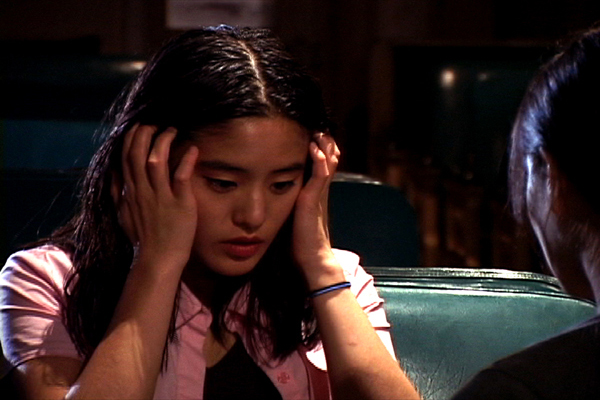Trinh T. Minh-ha numbers among the most important voices in the decolonialised/postcolonial and feminist discourse on film, literature, art, and theory. And on 22 March 2017, the interdisciplinary lecture series Transculturality will be hosting a public lecture by and discussion with this filmmaker and theoretician, who teaches at the University of California at Berkeley (USA). Her lecture will be followed by a screening of the postcolonial film classic Surname Viet Given Name Nam that will serve to illustrate how Minh-ha has succeeded in questioning conventional modes of visual perception, thought, and reception.
“It is necessary for me always to keep in mind that one cannot really theorize about film, but only with film. This is how the field can remain open.”
(Minh-ha 1992: 122)

Trinh T. Minh-ha is known as a pioneer of interdisciplinary thought and creativity, as is clearly evidenced by her output in a diverse range of artistic and academic formats. Relegating her to any one particular discipline would be an act of oversimplification, for Minh-ha’s filmic and theoretical work interlaces multi-layered forms of writing, portrayal, and narration, an aspect that she cultivates most clearly in connection with socio-political and geographic borders. Her oeuvre can only be understood as an overall phenomenon, to be approached via various disciplinary, cultural, and discursive perspectives.
Postcolonial Aesthetics
As far back as the early 1980s, Minh-ha began complexifying and rethinking the extent to which local, national, and regional film cultures are connected with one another at the global level. Her oeuvre expresses her particular position, one from which she consistently resists and opposes preordained categorisations and strict attributions. She instead seeks to arrive at polycentric, multidirectional, and non-essentialist alternatives to rigidly established Eurocentric theories and historical perspectives. Minh-ha’s mode of narration focuses on the interlacing, deconstruction, persistence, and efficacy of present-day political and social struggles as well as scholarly practices and ways of thinking. She counters both film as a medium and film studies as a discipline with a critical perspective that questions models of occidental ideologies along with their theoretical and historical referential frameworks.

Minh-ha’s artistic work revolves around the interplay between the historical past of cultures’, subjects’, and knowledge’s representational forms and said forms’ persistence in present-day postcolonial societies. This dynamic is characterised by multifaceted processuality, corresponding to a central postcolonial concern. The point here is to deliberately seek out postcoloniality as a thing that is conceptually linked to times and locations, a phenomenon that Trinh T. Minh-ha’s filmic output addresses as political statements that provide structure and challenge Minh-ha herself as well as her viewers to think and act in a way that transcends imperial and national pictorial logics. For postcolonial film output aims to interrelate postcolonial subjects, epistemologies, geographies, and historiographies, lending expression to all these through the lens of postcolonial circumstances.
A Practice of Reflexivity
That which Trinh T. Minh-ha refers to with the statement, “Sometimes the mind freezes and the heart goes on fasting: name, nation, identity, citizenship disappear,” in her recent publication Lovecidal, Walking with the Disappeared (Minh-ha 2016) has its roots all the way back in her early works. Her 16 mm film Reassemblage, shot in Senegal in 1982, can be understood as a milestone of postcolonial aesthetics: “I do not intend to speak about. Just speak nearby,” is how Minh-ha, in her own spoken commentary in the film, describes her methodological approach. Not necessarily displaying the what of villagers’ everyday lives, but much rather giving form to the how and completely refraining from clear attributions of ethnological practice, is a defining quality of this film’s conception. Inherent to this practice of speaking nearby is a critique of the classic documentary along with its purported authenticity.
A Language of Multivocality

Minh-ha’s third, multiple award-winning film Surname Viet Given Name Nam (1989) likewise tackles the thematic complexes of geographies, realms of portrayal, and narratives as theoretically and formally multi-layered reflections on the issue of which voices are heard in which ways. Much like her Forgetting Vietnam (2015), this film is viewed as a deeply personal documentary and essayistic coming-to-terms with historical and contemporary memories, experiences, and conflicts as well as the socio-cultural makeup of individual women’s voices in North and South Vietnam. Its filmic montage is based on an complex interplay of dance sequences, printed texts, recited poetry, and conversations between women in Vietnam and the USA. These are, in part, translated multiple times and/or re-enacted—without this fact being an explicit theme. Via blank spaces in terms of content, narrative breaks, and both formal and aesthetic irritation, filmic representation and mechanisms of portrayal go through a shift in perspectives. These are made visible in terms of the fragmentary construction of image and sound: “Do you translate by eye or by ear?” (Minh-ha 1992:80), asks Minh-ha’s voiceover in Surname Viet Given Name Nam.
Changing Methods of Narration
The Vietnamese-American filmmaker and theoretician conceives of her filmic approach as a borderline occurrence that is engraved into her own biography and, at the same time, something to be deconstructed. To this end, the narrative space of filmmaking serves her as a concept for creative negotiations over cultural attributions of difference, which Anna Babka, in her introduction to the German-language edition of Minh-ha’s feminist classic Woman, Native, Other, describes as follows: “Difference as a concern, an attribute, and a passion” (Babka in Minh-ha 2010: 17).

In postcolonial thought, renegotiating notions of “I” and “we” corresponds to altered forms of narration. Neither of the two points of reference is constituted by a fixed, homogeneous, and forever inalterable substance; this new narrative of “we” and “I” much rather acts as a counterpoint to the debates on identity’s construction that have been raging ever since the 1980s. The filmmaker expresses this relationship in non-hierarchical gestures that challenge her recipients to assume a certain distance from the image and its meaning, resulting in the destabilisation of accustomed thought patterns.
Minh-ha is a pioneer in multiple respects, and her work is a translational interchange for sources of conceptual friction, the geopolitically interwoven, and the globally interlinked via which temporally hermetic historicity is uprooted and simultaneously rendered timeless. These are films that age supremely well—something that truly cannot be said of every filmic oeuvre—by virtue of the fact that their very substance is timeless even as they refrain from any claim to trying to being so. And this timeless quality is further proven by how Minh-ha’s films have established themselves as postcolonial milestones, as which they were received then as now.
Quoted literature

- Babka, Anna (2010) „Einleitung“, in: Babka, Anna (Hg.), Minh-ha, Trinh T. Woman Native Other, Postkolonialität und Feminismus schreiben. Vienna: Turia + Kant, 9–24.
- Minh-ha, Trinh T. (2016) Lovecidal, Walking with the Disappeared. New York: Fordham University Press.
- Minh-ha, Trinh T. (1992) „Film as Translation, Interview conducted by Scott MacDonald, 1989,“ in: Minh-ha, Trinh T. (Hg.) Framer Framed. New York/London: Routledge.
Event Tip
Public lecture by and discussion with Trinh T. Minh-ha as part of the mdw’s interdisciplinary lecture series Transculturality. To be followed by a screening of Surname Viet Given Name Nam (108 min., 1989).
Wednesday, 22 March 2017, 5.00 pm
Kleines Filmstudio
mdw – University of Music and Performing Arts Vienna
Anton-von-Webern-Platz 1
1030 Vienna

